Рекс Стаут - Her Forbidden Knight
Здесь есть возможность читать онлайн «Рекс Стаут - Her Forbidden Knight» весь текст электронной книги совершенно бесплатно (целиком полную версию без сокращений). В некоторых случаях можно слушать аудио, скачать через торрент в формате fb2 и присутствует краткое содержание. Город: New York, Год выпуска: 1913, Издательство: The Frank A. Munsey Company, Жанр: Классическая проза, Любовные романы, на английском языке. Описание произведения, (предисловие) а так же отзывы посетителей доступны на портале библиотеки ЛибКат.
- Название:Her Forbidden Knight
- Автор:
- Издательство:The Frank A. Munsey Company
- Жанр:
- Год:1913
- Город:New York
- ISBN:нет данных
- Рейтинг книги:5 / 5. Голосов: 1
-
Избранное:Добавить в избранное
- Отзывы:
-
Ваша оценка:
- 100
- 1
- 2
- 3
- 4
- 5
Her Forbidden Knight: краткое содержание, описание и аннотация
Предлагаем к чтению аннотацию, описание, краткое содержание или предисловие (зависит от того, что написал сам автор книги «Her Forbidden Knight»). Если вы не нашли необходимую информацию о книге — напишите в комментариях, мы постараемся отыскать её.
Serialized in The All-Story, August — December 1913
Her Forbidden Knight — читать онлайн бесплатно полную книгу (весь текст) целиком
Ниже представлен текст книги, разбитый по страницам. Система сохранения места последней прочитанной страницы, позволяет с удобством читать онлайн бесплатно книгу «Her Forbidden Knight», без необходимости каждый раз заново искать на чём Вы остановились. Поставьте закладку, и сможете в любой момент перейти на страницу, на которой закончили чтение.
Интервал:
Закладка:
“But I will,” said Lila. “Oh, I will! But are you sure I won’t have to testify? Are you sure?”
“Positeevely.”
“Then — couldn’t we do it today instead of tomorrow?”
“No,” Dumain smiled. “Eet weel take till tomorrow morning to get zee bail for Knowlton. Dougherty ees down to see heem now. Tomorrow afternoon eet will be — remember. I must go to see Siegel for zee bondsman.”
And he trotted off, leaving Lila with face still flushed and the shadow of a doubt in her eyes, but with her lips parted in a trembling, wistful smile.
But the plan of Lawyer Siegel, clever and effective as it was, nearly caused a disruption in the ranks of the Erring Knights.
For Dumain and Dougherty alone were in the secret, which they refused to divulge; and the three others strenuously objected. Booth and Jennings threatened, half in earnest, to go over to the prosecution and tell all they knew, while Driscoll made many pointed and cutting remarks concerning the source of the money they were using. But the little Frenchman and the ex-prizefighter were as adamant.
“It’s Miss Williams’s secret,” said they, “and it wouldn’t be fair to her to tell it. The fact is, she asked us not to.”
This last was not true, but Dougherty knew they wouldn’t ask Lila.
“And all we’re good for, I suppose, is to sit round with our hands in our pockets,” said Driscoll bitterly. This was on the day after the plan had been consummated. “You get Knowlton out on bail and don’t show up in the lobby for a day at a time, and when you come back expect us to clap you on the back and tell you how well we like you. It’s not a square deal.”
“Now, listen here,” said Dougherty; “don’t be a sorehead. The trial is day after tomorrow; can’t you wait that long? Besides, you fellows have had your share. You’ve been bringing her to work every morning and taking her home every evening, and, believe me, that’s some job.
“And here’s another. If Knowlton gets out — and he will — there’s going to be a little dinner for him and Lila in Dumain’s rooms Friday evening. The trial can’t last more than one day. We’ll leave that dinner to you and Booth and Jennings. When Dumain comes in this afternoon he’ll give you the keys to his flat and all the money you need. Go as far as you like.”
“For how many?”
“Seven. Us five and them two.”
Driscoll grunted, and departed to consult with Booth and Jennings.
On Thursday evening, the day before the trial, Miss Williams was escorted to her home by Dougherty himself. She was depressed and nervous, and his repeated attempts to rally her spirits were unsuccessful. They dined at a little restaurant on Columbus Avenue, and from there walked to One Hundred and Fourth Street.
“Brace up,” said Dougherty, as they stopped at her door. “This time tomorrow night you’ll be ready to start on your honeymoon. Don’t you like the idea?”
“What do you think he is doing now?” asked Lila, with apparent irrelevance. She had learned to talk to Dougherty as to a chum.
“Reading your letters,” said the ex-prizefighter with conviction. “He always is. And now you go up and get to bed and sleep. None of this endless night business.”
Lila was standing in the open door.
“I’ll try,” she promised, smiling. “Good night, and thank you. I’ll be waiting for you in the morning.”
Chapter XVII
The Trial
“May it please your honor, Mr. Foreman, and gentlemen of the jury—”
The speaker was a United States assistant district attorney; the scene, a Federal courtroom in the post office building on Park Row. John Knowlton, alleged counterfeiter, was on trial before twelve of his peers.
The room was old and dingy — the building itself has been called the ugliest in New York. The jurybox, the benches, the railings, were blackened by time and use; the clerk appeared to have been fastened to his desk for many years. A dreary, melancholy room.
The spectators’ benches are by no means filled; most of the faces are familiar ones. In a group at the right are Detective Barrett and his two men, with Billy Sherman. Seated side by side on the front row of benches are Driscoll, Booth, Dumain, Jennings, and Dougherty. Toward the rear of the room Lila is seen, and by her side — Mrs. Amanda Berry! There are some dozen others — hangers-on, sensation-seekers, and young lawyers.
Knowlton, who was seated by the side of his attorney and engaged in a whispered consultation with him, looked up quickly as the prosecuting attorney rose to address the court and jury. The clock on the wall pointed to half past eleven; ninety minutes had sufficed for the preliminaries, including the selection of the jury. Lawyer Siegel had proven extraordinarily easy to please, thereby earning the gratitude of the judge.
“May it please your honor, Mr. Foreman, and gentlemen of the jury—”
The assistant district attorney proceeded with his opening speech. He was a young fellow — perhaps eight and twenty — and he spoke with the earnest enthusiasm of youth, with forceful, sounding phrases.
The prisoner felt his cheeks burn more than once at their sting. He wound up with the assertion that he would produce sufficient evidence to convict ten times over.
Lawyer Siegel turned and whispered to his client:
“He didn’t let anything out — he’s a slick one.”
Before Knowlton could do more than nod in response Siegel had risen to his feet and begun the opening speech for the defense. It was surprisingly short; it entered not at all into details, or even the nature of his evidence, and amounted, in fact, to little more than a general denial. But as he stated that the accused would not be called to the stand in his own defense Knowlton perceived a swift, almost imperceptible, expression of doubt and disapproval flit across the faces of the jurors.
As Siegel sat down the prisoner turned for a fleeting glance at Lila; she smiled at him brightly.
The prosecuting attorney called his first witness:
“James Barrett!”
The detective had little to tell. He identified Knowlton and gave an account of his arrest, dwelling pointedly on his flight to the rear of the flat as they entered.
Siegel, for the defense, did not cross-examine.
The second witness for the prosecution was Billy Sherman.
“What is your name?”
“William Sherman.”
“Your business?”
“Journalist.”
“Your address?”
He gave a number on West Thirty-fourth Street.
There followed some questions concerning the length of Sherman’s acquaintance with the prisoner and the amount of time he had spent in his company; then the prosecuting attorney asked:
“Did you ever see Knowlton pass, or offer to pass, counterfeit money?”
Instantly Siegel was on his feet with an objection.
“Sustained,” said the judge.
This was the beginning of a battle royal between the two lawyers. Time and again the prosecuting attorney tried to make his point, approaching it from every possible angle; and time and again Siegel objected that the witness was incompetent to answer.
Finally the judge himself became impatient and addressed the assistant district attorney with some severity:
“Mr. Brant, this witness has not qualified as an expert. You must give up this line of questioning or dismiss him.”
Siegel seated himself with a triumphant smile. The prosecuting attorney frowned and cleared his throat. Knowlton cast a glance over his shoulder at the spectators’ benches and sent a smile to Lila.
Dougherty leaned over and whispered to Driscoll:
“I don’t know what the deuce they’re talking about, but that cagey little guy looks like he’d just stopped a swing on the jaw and was hanging over the ropes.”
Читать дальшеИнтервал:
Закладка:
Похожие книги на «Her Forbidden Knight»
Представляем Вашему вниманию похожие книги на «Her Forbidden Knight» списком для выбора. Мы отобрали схожую по названию и смыслу литературу в надежде предоставить читателям больше вариантов отыскать новые, интересные, ещё непрочитанные произведения.
Обсуждение, отзывы о книге «Her Forbidden Knight» и просто собственные мнения читателей. Оставьте ваши комментарии, напишите, что Вы думаете о произведении, его смысле или главных героях. Укажите что конкретно понравилось, а что нет, и почему Вы так считаете.
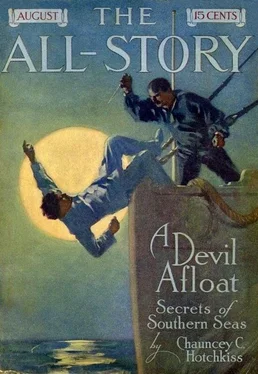
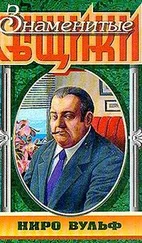
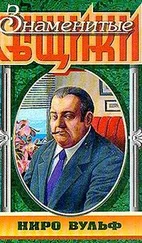
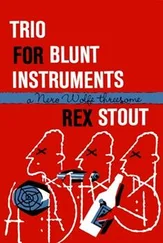
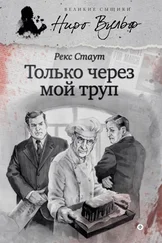

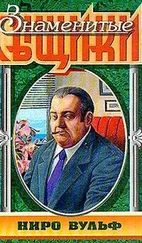
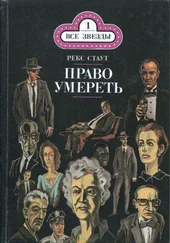
![Рекс Стаут - Лига перепуганных мужчин [litres]](/books/394342/reks-staut-liga-perepugannyh-muzhchin-litres-thumb.webp)